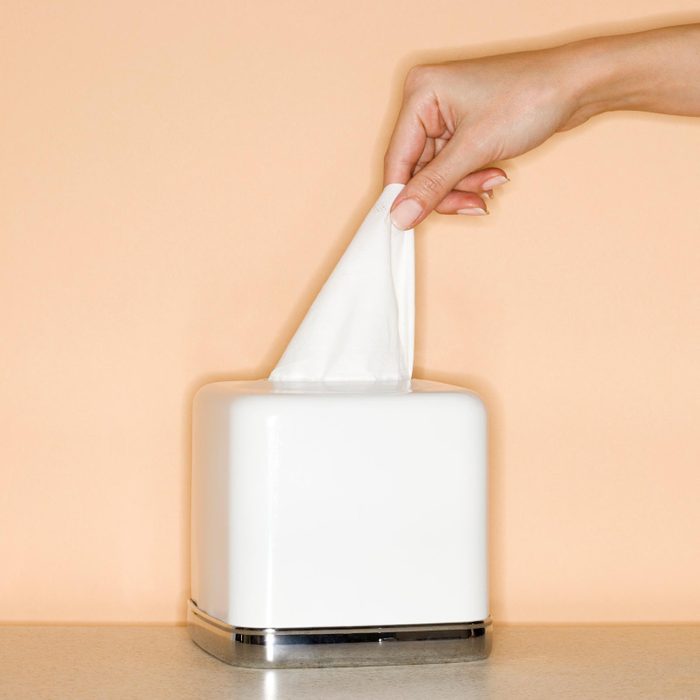Research Shows This Gross (but Common) Behavior May Increase Alzheimer’s Risk
Updated: May 22, 2024

Data suggest 91% of us discreetly engage in this unalluring habit. A scientist explains the surprising dangers that a recent dementia study uncovered, while an ear, nose, and throat doctor offers three wise avenues as alternatives.
Our editors and experts handpick every product we feature. We may earn a commission from your purchases.
Chances are, most of us as kids experienced an adult’s reprimand not to pick our nose…but in 1995, one psychiatry study proposed that more than 91% of adults dig for green gold. The world has changed since that study was conducted…but has human behavior? Here’s reason it should: Recent research has suggested nose-picking may be worse than just a social faux pas.
A 2022 Australian public health study in mice published in the peer-reviewed journal, Scientific Reports, found that this not-so-hygienic habit may increase your chances of developing age-related memory problems, including Alzheimer’s disease.
We spoke with the study’s lead researcher, and here’s why he and his team think this may happen: Picking your nose can damage its internal tissues, opening pathways for bacteria to access your brain. There, these bacteria can cause changes to your brain and nervous system that are associated with Alzheimer’s disease.
14 Everyday Habits Can Seriously Increase Your Dementia Risk
Here’s how the researchers reached this conclusion: Studies in mice showed that bacteria called Chlamydia pneumonia can travel up the olfactory nerve that links the nasal cavity and the brain. The bacteria use this nerve like a fireman’s pole and invade the central nervous system. Brain cells respond by depositing amyloid beta plaques, markers of Alzheimer’s disease, in the brain.
“There is a strong link between some microorganisms and Alzheimer’s disease because the microbes have been detected within the plaques of Alzheimer’s disease patient brains,” study author James St. John, PhD, tells The Healthy @Reader’s Digest. Dr. St. John is head of the Clem Jones Centre for Neurobiology and Stem Cell Research within the Griffith Institute for Drug Discovery and the Menzies Health Institute Queensland at Griffith University in Australia.
Now, Dr. St. John and his colleagues are setting up a smell clinic to find out which bacteria are present in the noses of people with late-onset Alzheimer’s. They plan to use this information to work on treatments to reduce the effect of these bacteria and reverse symptoms.
So while nose-picking might seem like an impolite but rather innocent habit, Dr. St. John says there are ways to protect your health as researchers try to clarify the link between nose picking, bacteria, and Alzheimer’s disease.
Eating This Every Day May Help Fight Dementia, Says New Study
Don’t pick your nose or pluck the hairs from your nose
This can damage the lining of your nose and help bacteria hatch their escape plan. “The bacteria could then penetrate in larger amounts into the olfactory nerve and brain,” he says. “Our work shows that damaging the nasal lining can make it worse, which could happen if you pick your nose too vigorously.”
Linda Dahl, MD, an ear nose, and throat specialist affiliated with Lenox Hill Hospital in New York City, says that for people who pick because their nose is dry, try using a saline spray or blowing your nose more often. “Use a little bit of Neosporin or another antibacterial ointment at the rim of the nose twice a day,” Dr. Dahl says, “where it can add moisture and kill bacteria.”
An MD Lists the 5 Warning Signs You Have Bad Hygiene
Other smart ways to prevent Alzheimer’s disease
According to research presented at the American Academy of Neurology 2023 meeting in Boston, seven specific habits and lifestyle factors may play a role in lowering dementia risk. The American Heart Association’s “Life’s Simple 7” program includes being active, eating better, maintaining a healthy weight, not smoking, maintaining healthy blood pressure levels, controlling cholesterol, and having normal blood sugar.
You get one point for each healthy habit for a maximum of seven points. The higher your score is in middle age, the experts say the lower your risk of developing dementia down the road. For every increase of one point in the score, the risk of dementia decreases by 6%!
Keeping your hands away from your nose may be one way to keep your brain healthy. Another? Paying attention to what you put in your mouth: Experts say that what’s good for the heart is good for the brain, and a heart-healthy diet rich in omega-3 fatty acids, lean protein, fruits, vegetables, and whole grains may reduce Alzheimer’s risk by 53%.
Need another reason to keep your digits out of your nose? Germs that enter the nose can also increase your risk of miserable respiratory infections like flu, COVID-19 or even pneumonia.
- Are You Addicted to Drama? This Doctor’s 2-Minute Quiz Can Help You Find Out
- I Walked Everywhere I Needed to Go for a Week—Here’s What Happened
- This One Emotion Is Worse for Your Health Than Junk Food, According to a Leading Functional Medicine Doctor
- What Is Medical Gaslighting? 9 Doctors’ Statements That Are Major Red Flags




















